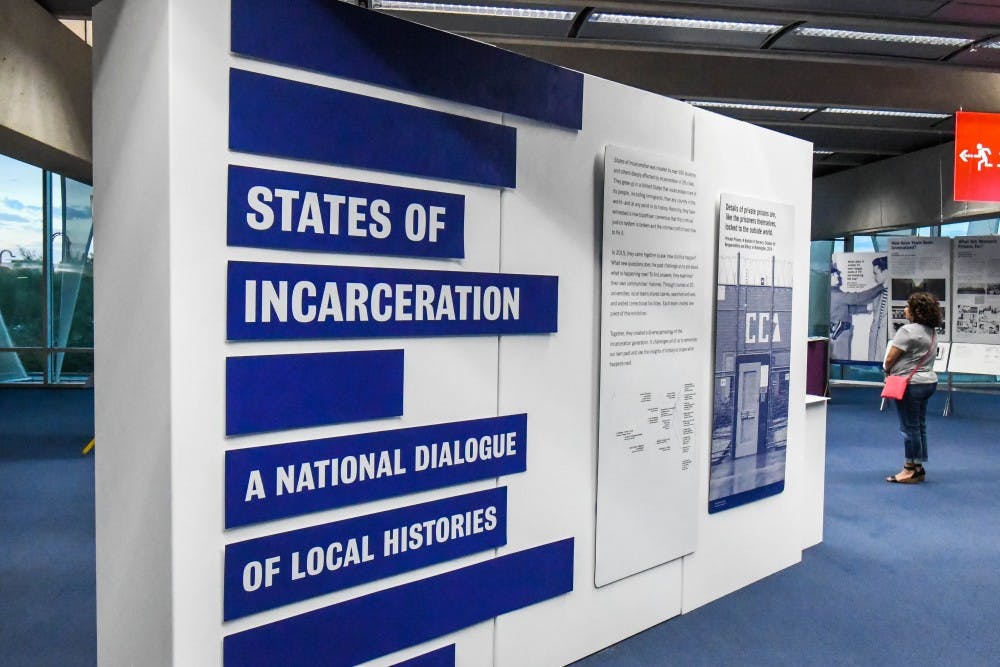In an exhibit about the impacts of mass incarceration, ASU contributed an in-depth focus on Arizona immigration detention centers.
On display at Burton Barr Phoenix Public Library until Oct. 27, the display contains student research from 20 universities in cities disproportionately affected by mass incarceration. ASU’s panel in the States of Incarceration exhibit explores local stories to promote national awareness and conversations on immigration incarceration.
A February 2018 report by the National Immigrant Justice Center found that on average Immigration and Customs Enforcement held over 40,000 immigrants in detention daily during fiscal year 2017, and that the White House requested funding to bring the daily total to over 51,000 for fiscal year 2018.
Throughout his presidency, President Donald Trump has signed multiple executive orders surrounding immigration.
Immigration detention is at the forefront of Leah Sarat’s research. Sarat, an associate professor in the School of Historical, Philosophical & Religious Studies, is a project partner behind ASU’s participation in the exhibit.
Additionally, Sarat taught a class at ASU on immigration and border crossing issues. She said the class's contribution to the exhibit highlights human rights violations and differences between private and government-run detention centers.
Sarat said immigrant detainees told her they were served rotten food and given stained clothes. Additionally, women, due to lack of resources, were forced to make maxi-pads out of plastic bags, she said.
The Eloy Detention Center, which has 1,596 beds, was the focus of Sarat's research for the exhibit. The center is a private facility owned by CoreCivic, a for-profit prison company which, according to Sarat's research, controls 45 percent of immigrant detention beds in America.
Detention centers run by private companies are profit-driven due to the focus of how many detainees they can incarcerate, Sarat said.
Marcos Williamson, a Phoenix native and ASU alum, is the detention relief coordinator and director for Transcend Arizona, an organization that supports LGBT+ people in detention centers who were arrested or are seeking asylum.
Williamson said government-regulated detention centers run by ICE have better conditions for inmates than private detention centers due to federal regulations.
“The food we see in facilities run by ICE have normal food," Williamson said. "If you go to a privately run detention center, the food is close to being inedible due to getting it as cheap as possible, making prisoners have to use commissary money to buy food in private detention centers."
Judith Perera, a teaching assistant at ASU and one of Sarat's former students, created a documentary for the panel. Perera is licensed to practice state law in California and federal law through the Executive Office of Immigration Review.
The documentary, called "1994: Detention at Crossroads" discussed the evolution of immigration detention going back to Ellis Island, and explored detention centers in Pinal and Pima counties.
She said she hoped to bring more discussion about immigrant detention and how it affects surrounding communities.
Perera said she felt hopeless because the system targets individuals who aren't citizens. She said she saw inmates' spouses "sitting across from each other and not allowed to touch due to safety regulations. These people are not convicted of a crime, yet are treated like criminals."
"It took a lot emotionally to visit these places. It doesn’t matter how skilled you are as an attorney if (the) system is designed to injure somebody,” Perera said.
Sarat said she would like to break down barriers between ASU and the broader community on this issue.
“Much of the public are unaware of what is going on," Sarat said. "As soon as it is out of media spotlight, they forget. I would like to see more folks push for change by visiting centers and working in policy to address this issue."
Reach the reporters at ggarci52@asu.edu and mdhunte2@asu.edu or follow @gianagarciiia and @masaihuntertv on Twitter.
Like The State Press on Facebook and follow @statepress on Twitter.




